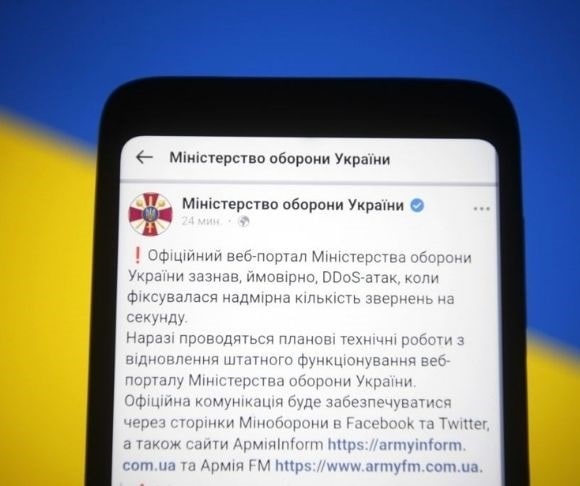Are the Russian threats of invasion materializing? Despite Russia withdrawing some troops from Ukraine’s border, Kyiv’s Defense Ministry reported it was under a “distributed denial-of-service” (DDoS) cyberattack. The Ukraine army’s computer capability was shut down, according to a Twitter message from the country’s Center for Strategic Communications and Information Security. A DDoS attacks information systems where an overwhelming number of requests per second overloads the computer servers’ capacity. Though Ukraine officials say the attack is being addressed and regular service restored, such intrusions by the Kremlin are part of its pre-invasion methodology.

Ministry of Defence of Ukraine’s Facebook webpage is seen on a smartphone screen with the Ukrainian flag in the background. (Photo Illustration by Pavlo Gonchar/SOPA Images/LightRocket via Getty Images)
Another explanation could be that it was a test of just how long it will take for Kyiv to recover. Nonetheless, the disruption in the capability to use information systems for command, control, and communication would be a severe blow to Ukraine forces’ ground and air defense. The time necessary to get systems back online and work properly would be the window to invade and move as quickly through the Ukraine countryside as possible. With each square mile Moscow’s forces occupied, the greater the loss of life and equipment. Additionally, as a preparation for an attack, offensive forces routinely probe an enemy’s defense to determine weaknesses and vulnerabilities. The February 15 cyber assault could be just that.
What Europeans now observe, we’ve seen in the past. Russia’s aggressive military activity often starts with cyberattacks that reduce the peoples’ confidence in their institutions like banks and local governments. Once people are discouraged over the unreliability of essential services and desperate for some semblance of normalcy, they will be open to alternatives. Enter Moscow establishing the Donbas region as officially independent from Ukraine.
It’s what you would expect. There must be a raison d’être. What better than to establish the Donbas region as a sovereign territory? To that end, the Russian Duma, the equivalent of a parliament, voted overwhelmingly to request Putin to “formally recognize two breakaway ‘republics’ in the Donbas region of southeastern Ukraine,” David Meyer wrote in Fortune. As the Duma calls them, the two republics are the separatist states of Donetsk and Luhansk. It is unlikely that Putin will immediately recognize the two “so-called republics, but he is likely to wield that option as a bargaining chip as he continues to demand security guarantees from the west,” according to Andrew Roth, correspondent in Moscow for The Guardian.
Suppose the Russian president decides to agree with the Duma. In that case, there is a formal Moscow position establishing the ethnic Russian part of Ukraine as independent and ripe for Kremlin occupation. Then any attempt by the Kyiv government to reunite the Donbas and the rest of the country Russia would claim as aggression on the sovereign territory of Donbas, or whatever the Kremlin will call the eastern part of Ukraine. So, Putin will have another made-up pretext card to play in his standoff with the U.S. and NATO. However, his demand that NATO not admit Ukraine into the alliance as negotiating leverage is weakening by the day.
 To that end, in a one-on-one meeting in Moscow on February 15, Russia’s President Vladimir Putin and the new German chancellor, Olaf Scholz, gathered to discuss Ukraine. Following the meeting, at a joint press conference, the Kremlin chief executive reiterated his demand Ukraine not be allowed membership in NATO. On the other hand, Scholz took the opportunity to call Putin’s persistent demands NATO membership be denied for Ukraine is irrelevant. Scholz said, “Everyone must step back a bit here and make it clear to themselves that we just can’t have a possible military conflict over a question that is not on the agenda,” as reported by The New York Times. Liberty Nation made this point in the article “Is Biden Pushing Europe Into War With Russia,” explaining there is little likelihood of obtaining the required unanimous agreement of NATO members for Ukraine membership.
To that end, in a one-on-one meeting in Moscow on February 15, Russia’s President Vladimir Putin and the new German chancellor, Olaf Scholz, gathered to discuss Ukraine. Following the meeting, at a joint press conference, the Kremlin chief executive reiterated his demand Ukraine not be allowed membership in NATO. On the other hand, Scholz took the opportunity to call Putin’s persistent demands NATO membership be denied for Ukraine is irrelevant. Scholz said, “Everyone must step back a bit here and make it clear to themselves that we just can’t have a possible military conflict over a question that is not on the agenda,” as reported by The New York Times. Liberty Nation made this point in the article “Is Biden Pushing Europe Into War With Russia,” explaining there is little likelihood of obtaining the required unanimous agreement of NATO members for Ukraine membership.
If there is good news to report, the official word from Moscow is Russia will be removing some of its combat troops from Ukraine’s borders. But seeing is believing. In a Tweet, Ukraine Foreign Minister Dmytro Kuleba said: “We in Ukraine have a rule: we don’t believe what we hear, we will believe what we see.” It sounds like the U.S. equivalent of “trust but verify” and is worth remembering. However, with the Russian cyber assault fresh in the minds of Ukrainians, Yogi Berra’s observation is more apt. “It ain’t over till it’s over.”
The views expressed are those of the author and not of any other affiliation.
~ Read more from Dave Patterson.




